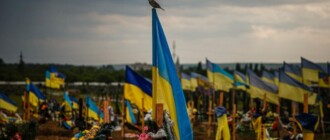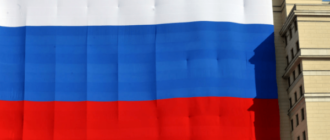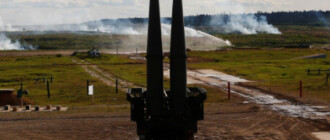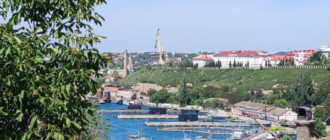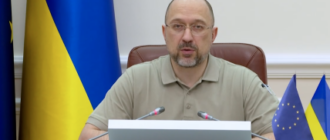
Ukraine is a young state situated in an ancient land with multiple cultural tributaries and historical experience with democracy that has been largely overlooked.
It stands at the crossroads of Europe, Russia and Central Asia, often as contested territory, especially due to its rich soil, which has made it a breadbasket to empires.
Scholars like historian Timothy Snyder have pointed out that, like the peoples of other border zones, Ukrainian society is largely multilingual and multicultural. So, if it joins the European Union, Ukrainians might have something to teach their new compatriots about tolerance.
Yet, it is Ukraine’s rich democratic heritage that could be most influential in shaping its national narrative.
According to historian Serhii Plokhy’s extraordinary overview of Ukrainian history, The Gates of Europe, the region has actually hosted several democratic societies since the arrival of the Greeks in the sixth century B.C.E. The Greek presence was limited to the coast of the Black Sea, where they set up trading outposts.
One of these Greek colonies, Pontic Olbia, was located in today’s Donbas region and was democratically governed. The community it left behind in Mariupol would last thousands of years before being destroyed over the course of the last few weeks. Little is known of such coastal city states, but the ancient Greek presence should remind us that Ukraine was linked to Mediterranean Europe long before core European states like France and Germany.
Ukraine’s democratic tributaries were also Slavic. At least two of the major Slavic tribes settling the territory around the fifth century A.D. were democratically governed. These tribes have been essential to the Ukrainian identity, but they would not govern long before being subsumed into a wider entity. Kyivan Rus was founded in the middle of the ninth century A.D. when, according to most accounts, Viking traders who had penetrated the river systems of Eastern Europe were invited to govern over warring Slavic tribes.
The establishment of Kyivan Rus is traditionally seen as the founding act of Ukraine, Russia and Belarus. Yet, if the Slavic tribes did choose their leader, it was a democratic act comparable to the Glorious Revolution of 1688, in which the British chose the Dutch William of Orange as their King. Kyivan Rus tends to be shrouded in myth, but the Vikings were known to be deeply democratic, electing their leaders through parliaments made up of males from each household.
This might help explain why Slavic tribes felt comfortable inviting them in to rule over them. Yet, just like the democratically governed Iroquois Confederation of North America, it is unclear whether their traditions impacted that of the wider culture in which they were situated.
The transfer of cultural habits across generations is never easy to trace, and it is all the more difficult to identify the spread of social habits like that of participatory decision making. The difficulty is only compounded by the multitude of cultures passing through Ukraine and its lack of written records.
Yet, it is noteworthy that the same democratic tendencies would appear in the Polish-Lithuanian Commonwealth, which overlapped with much of Kyivan Rus and contained a large part of today’s western Ukraine. This commonwealth is often seen as a precursor to modern democracy in that its parliament of nobles strictly limited the power of its kings amid a division of power.
Somehow, Ukraine once more found itself host to a partially democratic entity.
None of these states lasted, though, and most of what is known of their democratic structures is rudimentary. However, in Why Nations Fail, a magisterial overview of dozens of nations, Daren Acemoglu and James Robinson observe that deep socio-political structures reaching back sometimes thousands of years can be responsible for hampering efforts at democratization today.
In short, nations with a long history of inclusive government, in which governing elites have been forced to respond to public needs, are better prepared for democracy.
In this way, however touch and go it may have been, Ukraine’s thousands of years of experience with democracy may account in part as to why it’s resisting Russian rule so fiercely today. Still, David Stasavage observes in his ground-breaking global history, The Decline and Rise of Democracy, that democratic forms of government have been quite common throughout history.
They have existed in every region of the world and have often existed side by side with authoritarian states. So, while Ukraine may have seen an unusual number of democratic regimes over the centuries, it has not been wholly unique.
Yet, it is the Cossacks who escaped Russian serfdom to set up free communities on the south-eastern steppe land of today’s Ukraine that have captured the imagination the most. For the Cossacks defined their identities around resistance to serfdom, a form of slavery that bound peasants to lands over which they had no control.
And resistance to serfdom meant resistance to Russia, which has threatened Ukrainian freedom for hundreds of years now. In this way, references to Ukraine’s Cossack past highlight its democratic heritage, its resistance to foreign rule and its distinction from Russia.
We should not, however, be too quick to glorify Cossack freedom. As historian Marcel Von Herpen points out in Putin’s Wars, the Kuban Cossacks were used as the advance guard of Russian imperialism and were instrumental in its nineteenth century expansion into the Caucasus. They also often serve as Putin’s extralegal militias today.
However, Ukrainians tend to identify with a different group of Cossacks, the Zaporozhzhian Cossacks, who were located further west and led a more peaceful existence. Their resistance to serfdom helped bolster Ukrainian resistance to Soviet collectivization, which entailed punishing grain requisitions resulting in the Holodomor, a forced famine that killed at least 3.5 million Ukrainians in the early 1930s.
These experiences of Ukrainian society with democracy and resistance to authoritarian rule probably played some part in shaping the culture of the resistance we see today, but it is quite possible that the influence has been merely ideational. Nations typically draw from a range of historical sources in telling their stories, and sometimes these stories have little to do with life as it is lived at the time of their telling.
Yet, they can be a powerful source of inspiration, and in the case of Ukraine they might help define the nation around its highest aspirations toward democracy.
If we support Ukrainian sovereignty and democracy, we should look for ways to tell Ukraine’s story that highlight its differences with Russia and its place in Europe.
The past few generations have not been kind to Ukraine, so emphasizing this history can help transform some of its collective traumas by linking the present to a more fruitful past.
Yet, it is astonishing how seldom we hear mention of Ukraine’s Mediterranean connection to Europe or its rich democratic heritage. Nations are often born through good storytelling, and it is often the inspiration of their narratives that keep them from dying.
In this way, saving Ukraine also means telling a better story about where it has come from and where it is going.
Theo Horesh is the author of The Fascism This Time: And the Global Future of Democracy

